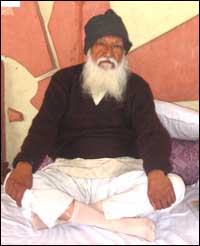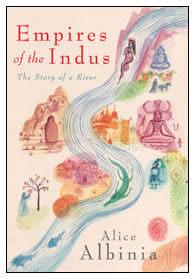Society, Culture, Religion and History
Kosi darshan: A deeper look at the lives of those pinned on the river
Posted on 31 Mar, 2009 05:14 PM"If it had not breached at Kusaha, it would have anyway breached at this point," points a villager towards the probable location on the eastern bank in village Rajabaas near Prakashpur in Sunsari district of Nepal, located 14 km upstream of Kusaha where the Eastern Afflux embankment of the Kosi had breached on the August 18, 2008.
WOTR wins Kyoto world water grand prize 2009
Posted on 29 Mar, 2009 04:12 PMAt the 5th World Water Forum, Watershed Organisation Trust (WOTR), was awarded the coveted Kyoto World Water Grand Prize at a glittering closing ceremony to mark the closure of the Forum on World Water Day (March 22) at Istanbul, Turkey. The award was presented to Dr Marcella D'Souza, Executive Director of WOTR in recognition of the outstanding contribution made towards organising rural communities for watershed development and rain water harvesting in an inclusive, equitable, sustainable and gender sensitive manner.
Screening films on water for World Water Day, 22 -23 March 2009, Bangalore
Posted on 19 Mar, 2009 02:30 AMDear Member Suchitra Film Society celebrates World Water Day with screenings of films on the theme of "Water"on 22nd and 23rd March 2009 at Suchitra Auditorium at 6.45 pm. The films are: > Jalatharangini, > Life in The River > Let's not Disturb The Water > Village of Dust, City of Water > Films on 'Ganga'.
Stay on suspension of Loharinag project!
Posted on 13 Mar, 2009 01:29 AMIt is with great disappointment that Raksha Sutra and Uttarakhand Nadi Bachao Andolan received the news from the report in Amar Ujala, Dehradun 27.02.09 that the Uttarakhand High Court has granted a stay to the Central Government Order suspending the work on the Loharinag , Pala (600 MW) hydroelectric project. The work on the project has begun with hardly a break in its stride. The Public Interest Petition filed by Rural Litigation and Entitlement Centre, a Dehradun based NGO filed for a stay stating that neither would the natural flow of the river be affected nor is the project causing any environmental damage is a total falsehood. The petitioners have deliberately misled the High Court. They have not visited the site for themselves and have filed for a stay from the sanitised environment of Dehradun. We who live and work in Uttarkashi know the truth. This is not the first instance that this NGO has taken legal action to restart projects that have been stopped because of their dubious benefits. It is quite clear that unlike its name this NGO is working not for rural entitlement but rather for the entitlement of vested interests. This is very saddening. The environmental impact of the project is enormous. Entire mountainsides have been scarred and shorn of their green cover. Thousands of tonnes of excavated rock from the tunnel construction have been dumped on the riverside and threaten to block the flow of the river with the onset of monsoon. The dust being churned day and night by the hundreds of dumpers and trucks operating on the project is choking all life on both sides of the river. Fields that were the mainstay of the primarily agricultural community are lying barren because no growth has taken place for the last 3 years despite the best efforts of the farmers. Pastures which sustained the livestock of the village people have been devastated. Representations by the people to the government and NTPC have yielded no satisfactory results. We have photographic and video evidence of this.
Book Review: Empires of the Indus
Posted on 29 Jan, 2009 10:56 AMEMPIRES OF THE INDUS : THE STORY OF A RIVER - by Alice Albinia
Pages: 366 ISBN-978-0-7195-6003-3 (978-0-7195-6004-0)
Format: hardback / trade paperback
Price: £20 / Rs. 550
Publisher: John Murray, U.K. Empires of the Indus is a comprehensive study of how the river Indus and its waterways have changed the history of the Indian sub-continent. Water is potent: it trickles through human dreams, permeates lives, dictates agriculture, religion and warfare. Ever since Homo sapiens first migrated out of Africa, the Indus has drawn thirsty conquerors to its banks. Some of the world's first cities were built here; India's earliest Sanskrit literature was written about the river; Islam's holy preachers wandered beside these waters. This perhaps captures the essence of this Guardian First Book 2008 awardee, Empires of the Indus , The Story of a River, by Alice Albinia.
Protesting broken promises: Dr. G.D. Agrawal resumes fast-unto-death
Posted on 20 Jan, 2009 12:19 PM
Images of a dying river, handwritten Press releases & more: Images of a Struggle on Flickr Charging the Government of India with not keeping its solemn commitment to keep the River Bhagirathi alive in its pristine stretch from Gangotri to Uttarkashi, Dr. G.D. Agrawal has resumed his fast-unto-death from Makar Sankranti Day, Wednesday, Jan 14, 2009.
You may recall that Prof. G. D Agrawal, former Professor & Dean of Students at IIT-Kanpur, the first Member-Secretary of India's Central PollutionControl Board and one of India's foremost environmental scientists went on a fast from June 13, 2008 to seek uninterrupted flow of River Bhagirathi (Ganga) in its natural form between Gangotri and Uttarkashi. His demand was very limited & specific, i.e., that the River Ganga be allowed to flow in its natural form in this 125 km stretch from its origin. This is the only stretch left now where the Ganga can still be seen in its pristine form. Dr. Agrawal requested the Govt. of India & the State Govt. of Uttarakhand to stop construction of Hydro Electric Projects (HEPs) in this stretch so that river flow was not diverted through tunnels that would destroy its ecology and its unique self-purifying properties. (diagrams are provided in the attached press release). Indians across the world got sensitized and lent their support to Prof Agrawal. Many wrote or met the PM of India and the CM of Uttarakhand and requested them to protect the Holy Ganga , whom Pandit Jawaharlal Nehru described as India's civilizational identity.
Old wells at the Konark Sun Temple, Orissa
Posted on 08 Dec, 2008 09:21 AMBoth Mohenjo daro and Harappa reported wells in every household and also community wells. They are perhaps the oldest in the subcontinent. Here is one open well from the Konark temple in Orissa. These must have been the sole providers of good clean water during that time and one of them continues to provide water for the repair work underway.







